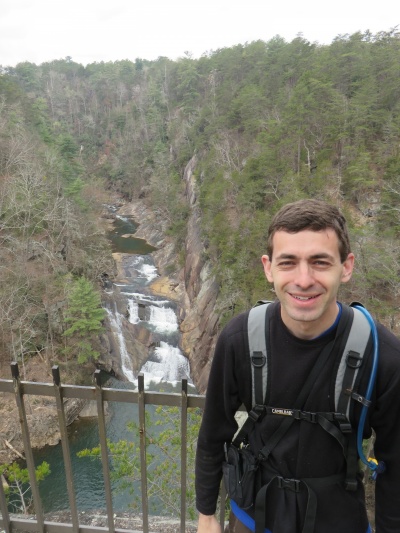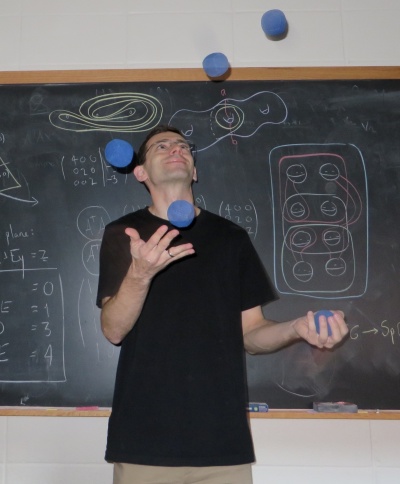- You are here:
- Home
May 11, 2016
| Atlanta, GA
What is your research about?
My research area is topology. In topology, we study properties of shapes that persist even when we stretch or bend the shapes. For example, if you have two metal rings that are linked, then they stay linked even if you bend or stretch the metal. A typical question in topology is the following: Someone hands you two rings made of metal; if you are allowed to bend and stretch the metal, can you pull the rings apart or not?
Most of my research in topology is about surfaces. The surface could be that of a ball or a donut. Surfaces are central in mathematics. They can describe the possible motions of a robot arm or all the possible solutions of a polynomial. My particular research is on the symmetries of surfaces - if we really want to understand an object, we must also understand its symmetries! Some symmetries of surfaces are easy to understand. But when we allow bending and stretching, they more challenging.
Mathematics is important because it describes the world in a beautiful and coherent way. Even the most far-fetched and abstract mathematical ideas can make their way into everyday life. For example, I was very pleased recently to attend a lecture at Georgia Tech by Jesse Johnson, a topologist who is currently working at Google. He described an application of his research on the topology of three-dimensional manifolds to the analysis of large data sets. This was shocking to me and very satisfying.
What has been the most exciting time so far in your research life?
It's always the new thing that's the most exciting. Just recently my computer finished a months-long linear algebra calculation that told my collaborators and me something about an important problem in geometric group theory. We still don't completely understand what the computer is telling us, but for me that is the most exciting part - being on the cusp of discovery.
How did you find your way to mathematics research?
I've had some great teachers from childhood all the way on up. I remember my grandfather explaining trigonometry to me on his back patio. And I remember my dad explaining binary to me at our kitchen table. Both of them were born mathematicians, but they never got the chance.
When I was an undergraduate at Brown University, I took a class called The Fourth Dimension with Tom Banchoff. That's where I first learned about Klein bottles and Mobius strips and other surfaces. I read books by Edwin Abbott Abbott, Martin Gardner, and Ian Stewart. I spent a weekend trying to build a torus (the surface of a donut) with 14 flat triangles. At that point I was hooked.
Dan Margalit, the juggler
What advice would you give to a college freshman who wants to be a mathematician?
If you love math, you should do math. Don't be discouraged if people around you seem smarter, faster, or more knowledgeable. There is way more to math than being a genius or a prodigy. If you love what you do, you'll be successful.
If you could not be a mathematician, in what line of work would you be now?
I don't understand the question.
I'm kidding, but I really have no idea. I enjoy writing and teaching. I especially enjoy finding the right way to explain a particular topic to a particular group of people. I could possibly get that kind of satisfaction from teaching high school or writing popular mathematical or scientific nonfiction.
What is the most exciting thing about being a part of Georgia Tech?
The science! The sheer volume of exciting scientific research that comes out of Georgia Tech is astounding.
What are you most surprised about in your encounters with Georgia Tech students?
They work very hard. And they take responsibility for their successes and failures. I don't know how many times I was expecting a student to complain to me that my test question was too hard, only to have them tell me it was a completely fair question and they should have gotten it.
What unusual skill, talent, or quality do you have that is not obvious to your colleagues?
I used to be a very avid juggler, doing stage performances and street performances. I once juggled 7 balls for something like 10 seconds. It was glorious - even though nobody else saw it!
What is your ideal way to relax?
I love hanging out with my family. I love being in the mountains. I love singing and playing music. I try to do something for myself every day.
What three destinations are still in your travel to-do list?
I'm not a big traveler. When I lived in Utah, I developed a love for the great outdoors. Places like Alaska, New Zealand, and Patagonia - dramatic landscapes at the corners of the globe - are appealing to me.
If you won $10 Million in a lottery, what would you do?
I like my life, so I wouldn't make a lot of changes. I have various fantasies for popularizing math and improving math education, so I'd start thinking about ways to act on those.


